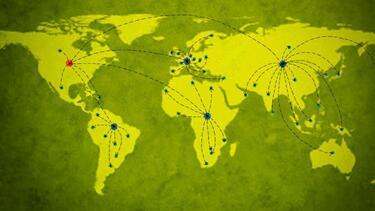Competitive Strategy
The Balloons Signal a New Age of Mass Surveillance
Prof. Paul Bracken, an expert in global competition and strategy, says these encounters reveal an urgent need for citizens and governments to catch up on how much we’re already being spied on.

How Do You Market a TV Phenomenon?
Starting in the late 1990s, a series of television shows with a novelistic sweep, many of them produced by cable channels, have redefined the medium; at the same time, technology has given audience members new ways to engage with each other and their favorite shows. As AMC’s executive vice president of marketing, Linda Schupack '92 has had the job of selling two of the biggest hits of TV’s second golden age: Mad Men and Breaking Bad. She talked to Yale Insights about creating great marketing for great stories.
How Does Chanel See the Global Luxury Business?
The global luxury goods market recovered quickly from the financial crisis due in large part to growth in emerging markets, especially China. Chanel CEO Maureen Chiquet YC ’85 discusses how she shepherds the quintessentially French company in a fast-moving global market that may be transcending national identity.

Market Rule Breakers Pay a Price
Organizations that don’t conform to the norms of their market category are penalized with higher prices, according to new research co-authored by Professor Amandine Ody-Brasier.
Is antitrust law keeping up?
Can laws created to rein in the monopolies of the industrial age still work in the information age? After spending a year as the top antitrust economist at the U.S. Department of Justice, Professor Fiona Scott Morton describes the state of antitrust regulation today.
How do you set strategy for a global enterprise?
Long-term thinking often gets lost in solving short-term problems, but the most successful companies make corporate strategy a top priority.

Classroom Insights: Grand Strategy for the CEO
How can business leaders cultivate the broad understanding and strategic agility they need to build successful organizations? Charles Hill, an accomplished diplomat and co-founder of the Studies in Grand Strategy course at Yale, talks about how ideas from great thinkers—from Herodotus to Clausewitz—can improve business decision making.
Can diplomacy benefit business?
The days of U.S. boycotts of South Africa are long gone. The country is an economic powerhouse in Africa and a key economic partner for the U.S. In four years as U.S. ambassador to South Africa, Donald Gips ’89 worked to increase investment and trade flows between the countries.
America’s Strategy Vacuum
The Federal Reserve’s policy of open-ended quantitative easing emphasizes short-term tactics over longer-term strategy, writes Stephen Roach. “The focus, instead, should be on accelerating the process of balance-sheet repair, while at the same time returning monetary and fiscal policy levers to more normal settings.”
Immigration and Innovation
As legislators negotiate comprehensive immigration reform, Professor Mushfiq Mobarak explains, in a commentary in the New York Times, the importance of skilled foreign workers in sustaining the United States’ comparative advantage in science and innovation.
Private Equity in Transition
A recent online discussion with three experienced private equity professionals provided a survey of the industry’s development over the last decade, as well as advice for those interested in moving into the field. The participants were Peter M. Schulte ’83, Dan O’Connell ’80, and Sally Rocker ’81. The discussion was moderated by Andrew Metrick, Yale SOM Deputy Dean for Faculty Development & Michael H. Jordan Professor of Finance and Management.